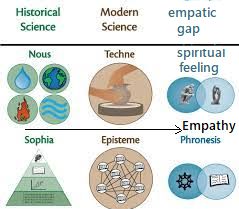
Arquivo para January 12th, 2022
Empathy and social interaction
Although in some areas such as administration and health there are already works on empathy as an improvement in social relationships, it is far from clear that it is not just an attitude of sympathy, emotional contagion or a caring relationship (Pedersen, 2010), it is not, therefore, a “tactic” of building relationships.
are already works on empathy as an improvement in social relationships, it is far from clear that it is not just an attitude of sympathy, emotional contagion or a caring relationship (Pedersen, 2010), it is not, therefore, a “tactic” of building relationships.
We have already outlined the reasoning that goes from thought to character (Meryl Streep’s phrase in the movie “The Iron Lady”) and must therefore be an exercise in ethical character.
The concept of phronesis (phronesis) translated as “practical wisdom” or “prudence” is developed in Aristotle, in book V of “Ethics to Nicomache”, is this understanding of the empathic and wise being in Aristotle correct? And if so, does being wise in practical matters mean better understanding the phenomenon of empathy?
Along with phronesis in the Nicomachean Ethics are other virtues such as areté (the excellence or supreme virtue) and Aristotle will associate it with five different forms when it comes to human activities, we could say social: the episteme (organized scientific knowledge), the techne (technical knowledge), phronesis (practical wisdom) and sophia (philosophical knowledge) and nous (intellectual “flanks”), of course all these concepts must be contextualized in the contemporary world.
Practical wisdom as Aristotle characterizes it is a kind of knowledge of how to act in practical situations (remember words become actions and actions become habits and define character), but he also speaks of technical expertise, in case that the objective of the activity must have some knowledge beforehand to carry it out, the idea that intuition or inspiration (nous) without technical knowledge is enough is useless.
Empathy is thus a type of discernment, a way of seeing what is happening in the world around us with other human beings, in this sense it is necessary to have wisdom (sophia) and to pay attention to different interpreters who are in a deeper way thematizing itself, maybe the word philosophy is worn out, so just sophia.
Contemporary philosophy Martha Nussbaum has shown how the Aristotelian notion of wisdom rests on understanding emotions as containing knowledge about the world that we share with other people, and phronesis is not devoid of feeling, on the contrary it helps the “sage” to understand and judge the person in a given situation.
Because of the ethical context, we are led to place empathy in the context of Aristotelian moral philosophy, which is a mistake, as phronesis is more appropriate, however, another mistake can happen to consider only as an “intellectual” virtue and disregard subjective aspects (including spiritual ones) that empathy should be placed.
Empathy is then a component of “feeling” related to phronesis, although it is a fact that some philosophers deny that empathy is essentially a feeling (Coplan, Goldie, 2011), we recall again that thoughts become words, these actions and then habits and when inserted in the character are already part of the “feelings”.
We resolved this dispute, it is not that simple, it is true, understanding that while they are not habits they need exercise and then inserted into the character, they are feelings or subjectivities (the subject’s own), but it is clear that it is not a natural attitude, although empathy In other words, “training” is needed.
Thus we detect in Aristotle a gap between practical wisdom and sophia, we would say a healthy spirituality or a capacity for interiorization.
References:
Coplan, A., and P. Goldie. 2011. Introduction. In Empathy: Philosophical and psychological perspectives, ed. A. Coplan, and P. Goldie. Oxford: Oxford University Press.
Pedersen, R. 2010. Empathy in medicine: A philosophical hermeneutic reflection. Oslo: University of Oslo, Faculty of Medicine.

